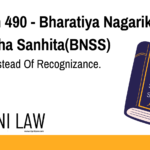Code: Exact Provision of Section 93 BNS
Whoever being the father or mother of a child under the age of twelve years, or
having the care of such child, shall expose or leave such child in any place with the intention
of wholly abandoning such child, shall be punished with imprisonment of either description
for a term which may extend to seven years, or with fine, or with both.
Explanation.—This section is not intended to prevent the trial of the offender for
murder or culpable homicide, as the case may be, if the child die in consequence of the
exposure.
Explanation of Section 93 BNS
This provision criminalizes the abandonment of a child under the age of twelve years by their parents or guardians. The law recognizes that such an act puts the child’s life at risk and imposes severe penalties to prevent such abandonment.
Key Elements of Section 93 BNS
- The offender must be a parent or legal guardian – This section applies to:
- Biological parents (father or mother)
- Any person having legal custody or care of the child
- The child must be under 12 years of age – The law protects vulnerable minors who cannot survive on their own.
- The act must involve exposure or abandonment – The offender must have left the child in any place with the intention of completely abandoning them.
- Punishment – The offender faces:
- Imprisonment up to 7 years, or
- Fine, or
- Both
Illustrations of Section 93 BNS
Example 1: A Mother Abandoning Her Child in a Public Place
A mother, unable to take care of her newborn, leaves the baby in a park and walks away. If caught, she can be punished under Section 93 BNS.
Example 2: A Guardian Leaving a Child on the Streets
A stepfather, unwilling to care for his stepchild, leaves the 10-year-old on a railway platform and does not return. This act is considered abandonment and is punishable under Section 93 BNS.
Example 3: Parents Leaving Their Child in an Orphanage Without Proper Legal Process
Parents secretly leave their 8-year-old child outside an orphanage gate at night without informing anyone. This act amounts to abandonment, making them liable under Section 93 BNS.
Common Questions and Answers on Section 93 BNS
1. What is meant by “exposing or abandoning a child”?
It refers to leaving a child in a situation where they are completely alone and at risk, with no intention of returning to care for them.
2. What if the child dies due to exposure?
If the child dies because of abandonment, the offender may be charged with murder or culpable homicide, as mentioned in the explanation of Section 93 BNS.
3. What is the punishment under Section 93 BNS?
The punishment includes:
- Imprisonment up to 7 years, or
- Fine, or
- Both
4. Does this section apply to accidental separation?
No. If a parent loses a child unintentionally (e.g., in a crowded place) and makes efforts to find them, it is not abandonment under Section 93 BNS.
5. Is leaving a child at a hospital or safe haven legally allowed?
In some states, there are safe haven laws that allow parents to legally surrender their child at designated places (e.g., hospitals, police stations). However, abandoning a child in an unsafe location is illegal under Section 93 BNS.
Conclusion
Section 93 BNS protects children under 12 years of age from being abandoned or exposed to harm by their parents or guardians. The law ensures strict punishment (up to 7 years of imprisonment and fine) while allowing harsher charges like murder or culpable homicide if the child dies due to abandonment.
For detailed legal guidance, visit ApniLaw today! 🚀








